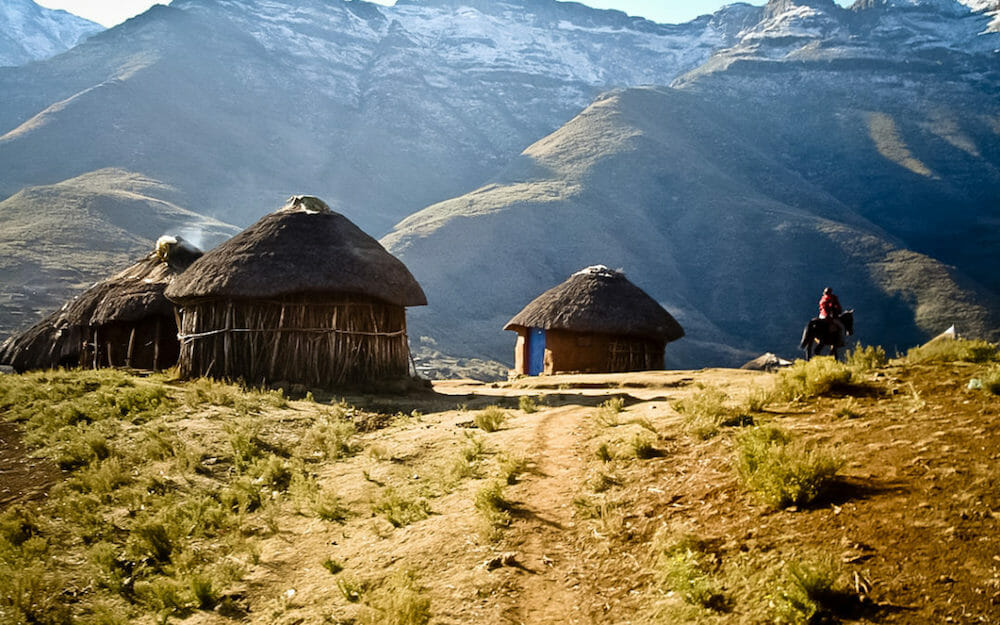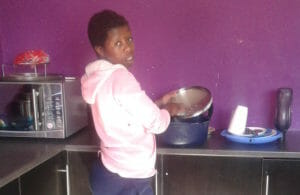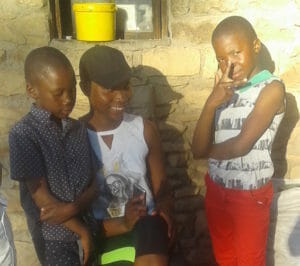Child Brides in Lesotho Lose Their Youth and Their Future
Forced into early marriages, teenage girls drop out of school and endure domestic violence, early pregnancy and exposure to HIV. A settlement in Lesotho, a poor, mostly rural country encircled by South Africa. (StephaniePacificBlog)
A settlement in Lesotho, a poor, mostly rural country encircled by South Africa. (StephaniePacificBlog)
Truthdig is proud to present this article as part of its Global Voices: Truthdig Women Reporting, a series from a network of female correspondents around the world who are dedicated to pursuing truth within their countries and elsewhere.
LESOTHO — From Latin America to the Middle East, early marriage is a global specter that robs girls of their futures. Instead of attending school and improving their chances in life, child brides face terrifying realities including domestic violence, dangerous early pregnancies and sexually transmitted diseases.
In Lesotho, a mountainous kingdom encircled by South Africa, the number of early marriages is alarming, with nearly one out of five girls marrying before the age of 18. The situation is particularly dire because Lesotho suffers from a devastating HIV epidemic.
In recent years, Lesotho human rights advocates have rallied to fight child marriage, but the powerful forces of tradition, poverty and gender inequality still stand in the way of progress.
Makabelo Lebate, 21, bursts into tears as she describes her life as a teenage bride.
“I was 15 years old and still a virgin when I was married off by my aunt to a man who was 32 years older than me,” she says. “I tried to escape, but I was caught and … locked in the house for three weeks. I was raped almost every day by my husband because I wouldn’t give my consent. [Finally] I couldn’t resist anymore, and I settled down as a wife.”
Lebate was 16 when she became pregnant with the first of her three children. “When I went for an HIV test, the results came back positive,” she says. “I told my mother-in-law, as I was afraid of my husband, and I discovered that my husband was already on HIV treatment.”
Lebate and her husband were uneducated. They lived in poverty in the rural district of Mokhotlong, where it was hard to find work. The nearest health care center was far away, and Lebate often had to go without medication to treat her HIV, which led to further health complications.
Child brides are likely to be exposed to sexually transmitted diseases including HIV/AIDS because these girls lack power to negotiate sexual terms, says Dr. Molotsi Monyamane, Lesotho’s former minister of health and an expert on sexual and reproductive rights.
Early marriages threaten girls’ health and well-being in other ways as well, Dr. Monyamane says. Early pregnancy often follows on the heels of a marriage, even if a girl isn’t physically or mentally ready to bear children. In developing countries, girls between the ages of 15 and 19 are twice as likely as older women to die from complications of pregnancy and childbirth.
Underlying Poverty
Several factors—including poverty—contribute to early marriage in Lesotho and other African countries.
“Parents … reduce family expenses by ensuring they have one less person to feed, clothe and educate,” according to the website of Girls Not Brides, a global partnership of organizations committed to ending child marriage.
Sometimes the girls’ families receive money as part of the marriage arrangement. Lebate’s aunt agreed to her niece’s marriage because she was promised a dowry in the form of cows, which would help ease her family’s desperate economic situation. (Lebate’s parents had died years earlier, so her aunt wielded authority.)

Matselane Linkeng, 24, married early as a means to support her younger siblings. Her mother died when Linkeng was 12 years old, and the girl became the sole bread winner. When she was 16, she met and married a man who was old enough to be her father. Linkeng was lucky as a young bride: The couple were happily married, and her husband helped provide for her siblings.
But two years later, her luck ran out.
“Things changed when I was 18 and my husband died,” Linkeng says. “My in-laws kicked me out of the house and took everything that belonged to our joint estate. I didn’t have money to institute legal proceedings and ended up leaving with my son, who was 2 years old.”
In Lesotho, women whose husbands die are often driven from their homes by their in-laws, who may claim the couple wasn’t legally married. Many widows fight the eviction in court, but Linkeng couldn’t afford the services of a lawyer and didn’t know she could have asked for legal aid services.
Tradition and Gender Bias
Entrenched cultural mores also drive early marriages. Forced elopement is a traditional practice in which a group of men organize and help one of their members take a girl as his wife, without that girl’s previous knowledge or consent.
Malerato Thibella, now 23, lived in the Thaba-Tseka district, where child brides are common. Thibella was “eloped” by a man in a neighbouring village when she was a 16-year-old student. He took her from her home, and when they arrived in the remote area where he lived, she learned she was a second wife. Polygamy is a traditional practice that is legal in Lesotho.
She later discovered her parents knew about the arrangement. “I couldn’t believe my ears when I was told that my own father … told this man I would be coming [home] for the school holidays,” Thibella says, with tears running down her cheeks. She rarely visited her parents because her school was far away, so her father’s tipoff set the stage for the abduction.
Because she couldn’t come to terms with the fact that she had married a stranger and, worse, that her husband abused her physically and emotionally, she ran away to live with an aunt in Maseru, the capital city.

Along with poverty and cultural factors, inherent gender inequality leads to early marriages. In countries such as Lesotho, families often don’t value girls and consider them to be a burden. “Marrying [off] your daughter at a young age can be viewed as a way to [transfer this burden] to her husband’s family,” according to the Girls Not Brides website.
The Fight Against Early Marriage
Human rights supporters in Lesotho have opposed child marriage for decades and recently stepped up efforts to ban the practice. In April of this year, Princess Senate Mohato Seeiso, 17—a daughter of the king and queen of Lesotho—launched an awareness campaign at an event attended by thousands of teenagers.
The princess urged lawmakers and parents to help change underlying social norms that perpetuate early marriage. ‘‘I am making a clarion call to everyone here that [these] are children, not brides,” she said. “Child marriage undermines the rights of young girls in different spheres of life. They … suffer physical, emotional and mental scars.”
Last year, Lesotho joined an African Union campaign to end child marriage. The African Union—a continent-wide organization that addresses social, economic and political issues—developed the campaign to promote policy change on early marriage, raise awareness of consequences and build a grassroots movement that includes lawyers, judges, teachers, health and social workers and religious and traditional leaders.
Mobilizing these leaders is critical to establishing lasting social change, according to Moeketsi Sello, head of a community in the remote district of Mohale’s Hoek. Sello says traditional leaders are considered champions of local culture, so educating them about the consequences of early marriage leads to educating the public.
Mohau Maapesa, a Lesotho attorney and advocate for women’s rights, says practical strategies are essential to change traditional thinking. These include holding educational sessions for parents and community leaders, as well as distributing handouts written in local languages.
Initiatives also work to empower girls by educating them about issues such as sexual and reproductive health. The information is especially important among the poorest and most marginalized teenagers in rural areas where child marriage is prevalent. Maapesa says youth groups are an effective way to transmit this vital knowledge.
Aftermath for Child Brides
Early marriage not only presents physical and emotional threats to teenage girls, but it also affects the rest of their lives. Child brides routinely drop out of school, which usually traps them in financial straits whether or not they stay in the marriage.

After years of being physically abused by her husband, Lebate left home with her three children. She moved to Maseru to look for a job, and she now works there as a maid. Her salary is small, but she says she’s able to put bread on the table. She is managing her HIV thanks to regular medication from a nearby clinic.
Linkeng is also employed as a maid in Maseru, and she says she and her son live in poverty because she earns so little.
Thibella, who doesn’t have children, was one of the fortunate ones when it came to education. With her aunt’s help, she graduated from Limkowing University in Maseru with a bachelor’s degree in education.
Thibella works for organizations that promote the rights of girls and women, although she’s currently between jobs. She is vocal about social issues such as abortion, gender equality and early marriage.
Lebate strongly supports efforts to protect girls from the fate she endured—and to empower them through knowledge. “I lived my whole childhood like a prisoner without rights, and I [urge people] to rescue these innocent souls,” she says. “Educating girls is one of the most powerful tools to prevent child marriage.”
Your support matters…Independent journalism is under threat and overshadowed by heavily funded mainstream media.
You can help level the playing field. Become a member.
Your tax-deductible contribution keeps us digging beneath the headlines to give you thought-provoking, investigative reporting and analysis that unearths what's really happening- without compromise.
Give today to support our courageous, independent journalists.






You need to be a supporter to comment.
There are currently no responses to this article.
Be the first to respond.